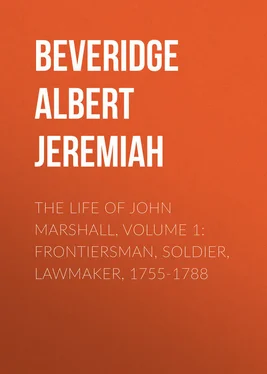Trevelyan, iv, 298.
Washington to President of Congress, Dec. 22, 1777; Writings : Ford, vi, 253.
Washington to President of Congress, Dec. 23, 1777; ib. , 257.
General Varnum to General Greene, Feb. 12, 1778, Washington MSS., Lib. Cong., no. 21. No wonder the desertions were so great. It was not only starvation and death but the hunger-crazed soldiers "had daily temptations thrown out to them of the most alluring nature," by the British and Loyalists. (Chastellux, translator's note to 51.)
Marshall, i, 227.
Ib.
Hist. Mag. , v, 132. This is, probably, an exaggeration. The British were extremely harsh, however, as is proved by the undenied testimony of eye-witnesses and admittedly authentic documentary evidence. For their treatment of American prisoners see Dandridge: American Prisoners of the Revolution , a trustworthy compilation of sources. For other outrages see Clark's Diary, Proc. , N.J. Hist. Soc., vii, 96; Moore's Diary , ii, 183. For the Griswold affair see Niles: Principles and Acts of the Revolution , 143-44. For transportation of captured Americans to Africa and Asia see Franklin's letter to Lord Stormont, April 2, 1777; Franklin's Writings : Smyth, vii, 36-38; also Moore's Diary , i, 476. For the murder of Jenny M'Crea see Marshall, i, 200, note 9, Appendix, 25; and Moore's Diary , i, 476; see also Miner: History of Wyoming , 222-36; and British officer's letter to Countess of Ossory, Sept. 1, 1777; Pa. Mag. Hist. and Biog. , i, footnote to 289; and Jefferson to Governor of Detroit, July 22, 1779; Cal. Va. St. Prs. , i, 321. For general statement see Marshall (1st ed.), iii, 59. These are but a few of the many similar sources that might be cited.
Trevelyan, iv, 299.
Marshall, i, 227.
John Marshall's father was also at Valley Forge during the first weeks of the encampment and was often Field Officer of the Day. (Weedon.) About the middle of January he left for Virginia to take command of the newly raised State Artillery Regiment. (Memorial of Thomas Marshall; supra. ) John Marshall's oldest brother, Thomas Marshall, Jr., seventeen years of age, was commissioned captain in a Virginia State Regiment at this time. (Heitman, 285.) Thus all the male members of the Marshall family, old enough to bear arms, were officers in the War of the Revolution. This important fact demonstrates the careful military training given his sons by Thomas Marshall before 1775 – a period when comparatively few believed that war was probable.
This was the common lot; Washington told Congress that, of the thousands of his men at Valley Forge, "few men have more than one shirt, many only the moiety of one and some none at all." (Washington to President of Congress, Dec. 23, 1777; Writings : Ford, vi, 260.)
Slaughter, 107-08.
Howe, 266.
Slaughter, 108.
Weedon, 134; also, Heitman, 285.
Ib.
Description of Marshall at Valley Forge by eye-witness, in North American Review (1828), xxvi, 8.
Ninth Virginia. (Heitman, 72.)
North American Review (1828), xxvi, 8.
Weedon, Feb. 8, 1778, 226-27. Washington took the severest measures to keep officers from associating with private soldiers.
Ib. , 227-28.
Ib. , Jan. 5, 1778; 180.
See Washington's affecting appeal to the soldiers at Valley Forge to keep up their spirits and courage. (Weedon, March 1, 1778, 245-46.)
Channing, ii, 559.
See Rush's anonymous letter to Henry and the correspondence between Henry and Washington concerning the cabal. (Henry, i, 544-51.)
Marshall, i, 217.
Trevelyan, iv, 301.
Ib. , 303-04.
"The idea that any one Man Alone can save us is too silly for any Body but such weak Men as Duché to harbor for a Moment." (Adams to Rush, Feb. 8, 1778; Old Family Letters , 11; and see Lodge: Washington , i, 208; also Wallace, chap. ix.)
Sparks, 252; and Marshall, i, 218.
Washington to President of Congress, Dec. 23, 1777; Writings : Ford, vi, 257-65. And see Washington's comprehensive plans for the reorganization of the entire military service. (Washington to Committee of Congress, Jan. 28, 1778; ib. , 300-51.)
Hist. Mag. , v, 131.
On April 10, 1778, Ædanus Burke of South Carolina broke a quorum and defied Congress. (Secret Journals of Congress, April 10, 11, 24, 25, 1778, i, 62; and see Hatch, 21.)
Trevelyan, iv, 291-92.
Washington to Harrison, Dec. 18, 1778; Writings : Ford, vii, 297-98.
Ib.
At this period and long after a State was referred to as "the country."
Washington to Harrison, Dec. 18, 1778; Writings : Ford, vii, 297-98.
Until after Jefferson's Presidency, our statesmen often spoke of our "empire." Jefferson used the term frequently.
Washington to Harrison, Dec. 18, 1778; Writings : Ford, vii, 301-02.
"My estate is a large one … to wit upwards of ten thousand acres of valuable land on the navigable parts of the James river and two hundred negroes and not a shilling out of it is or ever was under any incumbrance for debt." (Jefferson to Van Staphorst and Hubbard, Feb. 28, 1790; Works : Ford, vi, 33.) At the time of Valley Forge Jefferson's estate was much greater, for he had sold a great deal of land since 1776. (See Jefferson to Lewis, July 29, 1787; ib. , v, 311.)
Jefferson to Pendleton, July, 1776; ib. , ii, 219-20.
Jefferson's Autobiography ; Works : Ford, i, 57.
Tucker, i, 92 et seq. ; Randall, i, 199 et seq. ; Works : Ford, ii, 310, 323, 324.
Bloodshed, however, Jefferson thought necessary. See infra , vol. II, chap. I.
See vol. II of this work.
Jefferson's Autobiography ; Works : Ford, i, 79.
Burnaby to Washington, April 9, 1788; Cor. Rev. : Sparks, ii, 100-02. Washington sent no written answer to Burnaby.
See infra .
Washington to Banister, April 21, 1778; Writings : Ford, vi, 477-87. In thus trying to arouse Congress to a sense of duty, Washington exaggerates the patience of his troops. They complained bitterly; many officers resigned and privates deserted in large numbers. (See supra .)
Читать дальше












